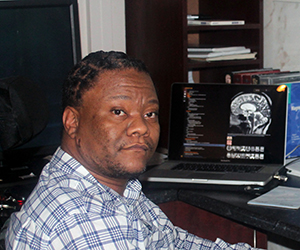Latest News Archive
Please select Category, Year, and then Month to display items
12 January 2024
|
Story Nonsindiswe Qwabe
|
Photo Sonia Small
 Since joining the UFS in 2008, Dr Grey Magaiza has worked extensively on approaches that can foster the socio-economic transformation of societies.
Since joining the UFS in 2008, Dr Grey Magaiza has worked extensively on approaches that can foster the socio-economic transformation of societies.
“The future should be one where communities can decide on their development agenda and futures. That’s the most important for me.” Dr Grey Magaiza, Deputy Director of the Centre for Gender and Africa Studies (CGAS) and Head of the Community Development programme on the Qwaqwa Campus, is passionate about capacitating communities to be agents of change and advancement. His vision for the future emphasises the empowerment of communities to take charge of their development by actively participating in decision making and the implementation of development projects that can improve their lives.
Since joining the UFS in 2008, Dr Magaiza has worked extensively on approaches that can foster the socio-economic transformation of societies. Over the years, he has crafted his research speciality into one that he is most proud of – being an interdisciplinary scientist immersed in the development of communities.
“I’m in a fortunate position of researching what I like. I say ‘fortunate’, because I’ve taken the time to understand what I’m passionate about, which is the overall field of rural livelihoods and livelihood futures – in short, community development. My research starts from an engaged university, understanding the elements that a university must use to enhance transformation and relevance to its immediate community in terms of development.”
One of the ways he has done this is by looking at social entrepreneurship as a development approach for young people in a rural setting. Through workshops with non-profit and civic organisations in Qwaqwa, Dr Magaiza has been helping these organisations to map out their needs and actively meet them through the involvement and support of external role players.
“We understand that communities are part of the national development agenda, but even that national agenda respects community knowledge and intentions and allows communities to shape their identity. A critical enabler of this is community organising. You bring back the capacity in communities to have dialogues on issues affecting them as spaces for engagement, knowledge exchange, and for people to just talk about their way forward.”
By enabling communities to define their development agenda, they can address their specific needs, challenges, and aspirations, he said. “When I look at livelihood futures, it’s quite an exciting aspect of my work – it’s like looking into a fortune tellers’ globe, because you’re not deciding for communities what they should do, but the communities themselves take those decisions.”
Quadriplegic doctor obtains degree against all odds
2016-11-25

Dr Swartbooi faces each day with vigour and
resilience. Dr Swartbooi analyses images on
a screen in the Clinical Imaging Laboratory
at Universitas Academic Hospital.
Photo: Oteng Mpete
Life’s defining moments are when perseverance is rewarded. It is not easy to swim against the tide. However, for Dr Ambrotius Swartbooi from the University of the Free State’s Department of Clinical Imaging Sciences, it became his moment of glory. In 2006, Dr Swartbooi suffered a spinal injury from a near-fatal car accident which left him paralysed and a quadriplegic.
The strength to carry on
“You have one of two choices:
to lie down and give up,
or to pick yourself up”
—Dr Swartbooi
Dr Swartbooi spent close to six months, recovering from his injuries. “You have one of two choices: to lie down and give up or to pick yourself up,” said Dr Swartbooi. He would inspire other patients with similar injuries to reintegrate into society despite their new-found circumstances.
Fortunately, not all was doom and gloom; in 2007 Dr Swartbooi got married, and his wife has supported and inspired him to continue pursuing his dreams. Dr Swartbooi completed his undergraduate medical degree at the UFS, and in 2014 decided it was time to complete his studies and pursued an MMed specialising in Diagnostic Radiology.
To treat or not treat: that is the question
After all his trials and tribulations, Dr Swartbooi will be receiving his MMed Diagnostic Radiology degree at the UFS Summer Graduation ceremony in December 2016. His research focuses on intracranial aneurysm size interventions. He discovered that there were discrepancies between international standards for intervention and African standards for intervention.
The research inspects what should be treated and how it should be treated. He found there was a gap in African literature into the size of aneurysms.
Champion of survival: Where to from here?
“That’s a good question,” said Dr Swartbooi. “Slowly from here. I still need to work on getting my full accreditation from the Health Professions Council of South Africa (HPCSA).” He plans to continue fuelling his passion for teaching. “There is no place better to teach than at an academic hospital.”
Dr Swartbooi commended the efforts of the Centre for Universal Access and Disability Support (CUADS), which assisted him in writing all his exams. “I want to be able to make a fulfilling and lasting impact on people but also to give the best medical service that I can,” concluded Dr Swartbooi.